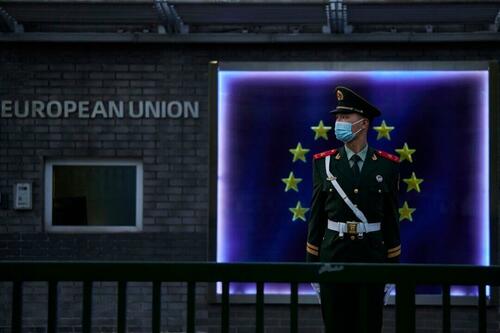Authored by Anders Corr via The Epoch Times,
The European Union is planning a rare-earth element stockpile, mining, and refinement strategy to be more fully revealed in mid-November.
The plan is to use import substitution to counter China’s rare-earth export controls on seven rare earths imposed in April.
However, it could take 10 to 15 years for Europe to become fully independent of China’s rare-earth supply, by which time Russia’s war may have eaten further into Europe’s eastern boundaries. Until the European Union credibly threatens tough tariffs against China—on the order of 100 percent mooted in October by U.S. President Donald Trump—Beijing is unlikely to relent. EU tariffs would provide plenty of leverage, as the European Union has had a persistent trade deficit with China of approximately 300 billion euros to 400 billion euros annually since 2022.
China’s control of rare-earth elements amounts to a global licensing system that could give Beijing a chokehold on the European Union’s artificial intelligence (AI), defense, automotive, and other high-tech sectors. Unfortunately, it’s mostly too late for the EU to stockpile rare-earth elements, as China is already restricting rare-earth exports. Some of the European Union’s past imports of rare-earth elements were 98 percent sourced from China. It could take a dozen years to fully diversify rare-earth mining and refinement away from China, according to SFA Oxford analysts.
Meanwhile, Europe’s defense and auto industries are at the mercy of Beijing, which is normalizing the notion that the Chinese Communist Party (CCP) has global control over such a critical input to Europe’s defense and industry—and, by extension, the sovereignty and commercial power of Europe’s many free nations.
The CCP’s rare-earth controls have, for example, tripled the cost of some rare-earth elements on global markets and rendered European sanctions on China toothless. These include sanctions for Beijing’s support of Russia’s war machine, whose strikes are already straying from Ukraine over the boundary into Poland, Estonia, and Romania. European sanctions on China’s totalitarian form of government, territorial aggression, support for dictators and terrorists around the world, and human rights abuse are also weakened to nonexistent due to Beijing’s rare-earth move.
Fighter jets, missile guidance, and drones require rare-earth elements to operate. The effect of the CCP’s controls on these European production lines is likely classified. But in June, the European Association of Automotive Suppliers, or CLEPA, warned of risks to the auto supply chain due to Beijing’s export controls on computer chips.
“Chips are essential for vehicle electronics and up to 700 other critical components,” CLEPA said in a press release at the time. “The shortage has an ongoing effect on key electronic systems such as radar sensors, which alone consume around one million chips per week.”
In September, CLEPA noted that European auto factories had stalled due to a shortage of rare-earth elements. BMW and other major automakers faced disruptions to their supply chains. While BMW is scrambling to produce rare-earth-free motors, this only works on larger electric engines. Rare-earth elements remain necessary for small electric motors that power everything from windows to wipers.
European sanctions will remain toothless until Brussels shakes its dependence on China’s rare earths, not to mention other strategic imports. The CCP found Europe’s Achilles’ heel, which will make it vulnerable to the demands of Beijing on opening European markets to China and providing key European exports to Chinese companies.
Beijing seeks semiconductor fabrication machines from the Netherlands, for example, which will surely be part of the ongoing negotiations. Beijing will be pressing Brussels for not only AI-capable chips, but the machines that make the chips.
The European Union is also impeded in its response to the Chinese regime’s growing international aggression in places like Taiwan, Japan’s Senkaku Islands, the Philippines, and India’s Himalayas. The lack of power that the EU has in negotiations with Beijing due to the rare-earth controls will buy China time to build its military and global diplomatic support for an attack on Taiwan, which could give Beijing control over the key Taiwanese semiconductor factories—also known as fabs—necessary to make the CCP even more fearless of the West’s economic sanctions. This was something that the former Soviet Union never achieved, making the CCP a greater threat than the Soviets ever were.
In 2022, the European Union announced an import substitution regime for rare-earth elements called the Critical Raw Materials Act. It seeks to replace much of the rare earths from China through domestic production by 2030, including domestic fulfillment of at least 10 percent of the EU’s extraction needs, 40 percent of its processing, and 25 percent of its recycling. Domestic EU mining and refining could be scaled up in case of an emergency. The European Union would limit dependence on any single foreign supplier to 65 percent of EU needs, which is likely still too much. Another initiative, ReSourceEU, will diversify rare-earth supply chains to Estonia, Australia, Canada, and Kazakhstan.
This is all too little, too late, and insufficient, given that the free world does not have 10 to 15 years to wait for the European Union to become independent of Beijing’s threat to throttle Europe’s rare earth supplies. Tougher measures must be considered.
Tariffing EU trade with China at 100 percent is the kind of penalty that could force Beijing to back down on its rare-earth export controls immediately. That would give Europe the time it needs to develop its own rare-earth supply, and never again to hock its sovereignty at a pawn shop in Beijing.
Views expressed in this article are opinions of the author and do not necessarily reflect the views of The Epoch Times or ZeroHedge.
Loading recommendations...
